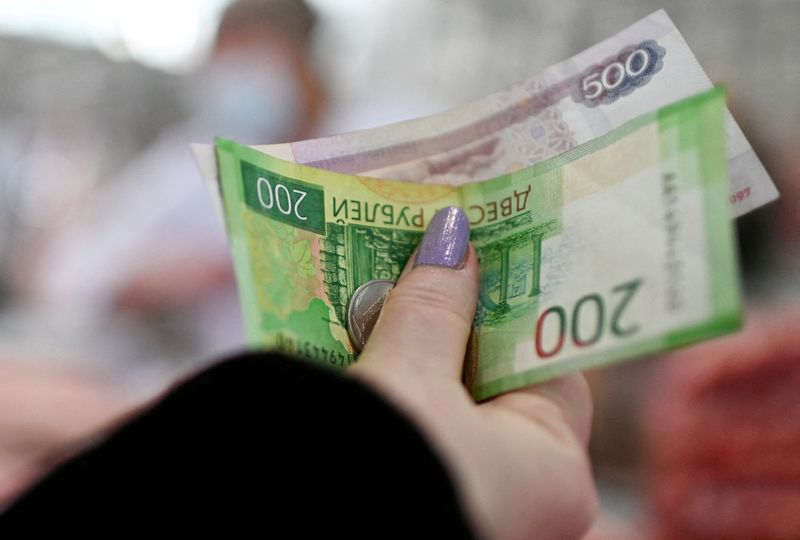Ruble Surges to Two-Month High as Demand for Cash Explodes
2022.09.23 12:40
[ad_1]

© Reuters
By Geoffrey Smith
Investing.com — The Russian surged nearly 3% against the dollar on Friday amid a surge in demand for cash, as Russians emptied their savings accounts in the wake of Wednesday’s mobilization call by President Vladimir Putin.
The ruble rose 3% to trade at 57.08 against the dollar amid reports of a nine-fold increase in demand for cash on the day after Putin said he would call up 300,000 reservists to bolster his campaign in Ukraine. The announcement triggered an exodus of men of fighting age, causing major tailbacks at border crossing points with Georgia, Finland, and Mongolia, among others.
The rise in demand for rubles led to a squeeze in interbank ruble rates, pushing the currency up in a market that has operated under heavy capital controls since the invasion of Ukraine in February. The surge in demand for cash is still far from the heights of February when Russians pulled over 1.4 trillion rubles from the banking system. That’s around 10 times the withdrawals seen on Thursday.
Russia’s stock and bond markets also resumed their decline Friday after a brief stabilization on Thursday: the benchmark index fell 4.3%, while the yield on the Russian government bond rose 25 basis points to 10.76%. It’s risen over a full percentage point in the last week.
The rise in bond prices came as Bloomberg reported that the Kremlin plans to raise defense spending by 43% next year, a move that, along with the mobilization of reserves, suggests that Russia is resigning itself to a long war after initially hoping to overcome Ukraine with a World War 2-style ‘Blitzkrieg’ in February.
Russia still has substantial financial reserves – at least on paper – with which to finance a war, but its budget situation has worsened as the war has dragged on. A collapse in corporate income tax receipts from the non-oil economy has been made worse by the recent decline in oil prices and a self-imposed cut to export revenues from .
After posting a budget surplus of 1.37 trillion rubles in the first half of the year, the budget appears to have posted a deficit of over 1.2 trillion rubles in July and August.
A government document cited by Russian newswires earlier in the week suggested that oil production – traditionally, the federal budget’s most reliable cash cow – is likely to fall around 6% next year under the impact of western sanctions and the consequent disruption to its pipeline system.
[ad_2]
Source link








